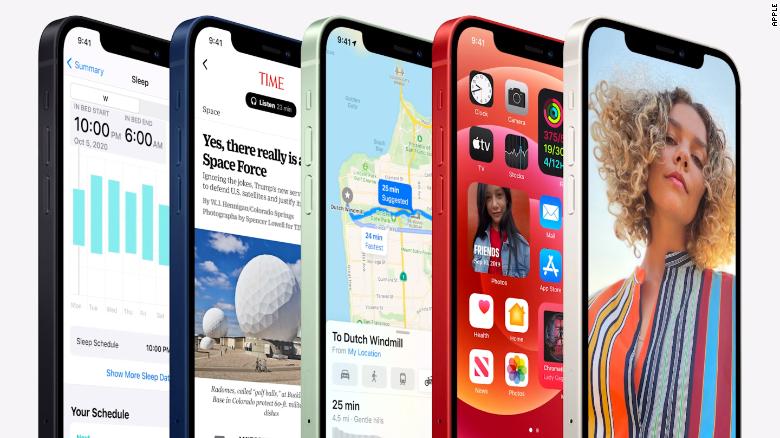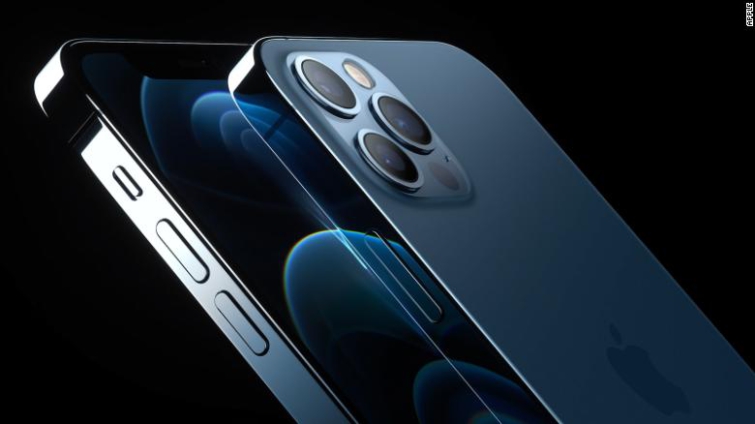Apple's 5G smartphone lineup is finally here. The company announced four new iPhones in a virtual event on Tuesday — the iPhone 12, the iPhone 12 Pro, the iPhone 12 Pro Max and a new, smaller, iPhone 12 mini. All the phones are 5G-equipped, meaning they can connect to the next-generation high-speed wireless networks.
"This is a huge moment for all of us and we're really excited," Apple CEO Tim Cook said. Apple will be hoping that its historically loyal user base will continue to shell out the big bucks to upgrade, even as the coronavirus pandemic continues to ravage the economy and forces millions to stay home. The cheapest phone in its new lineup — the iPhone 12 mini — starts at $699, while the top-of-the-line iPhone 12 Pro Max — featuring Apple's biggest ever smartphone display at 6.7 inches — will start at $1,099.
The iPhone 12 and 12 Pro will be available for pre-order on Oct. 16 and in store on Oct. 23. The iPhone 12 mini and 12 Pro Max will be available for pre-order on Nov. 6 and in store on Nov. 13.
The iPhone 12 comes in five colors — black, white, red, green and blue — and is thinner, smaller and lighter than its predecessor, the iPhone 11, the company said. It also features an upgraded XDR display and a new, tougher glass atop the display that Apple calls Ceramic Shield.
The new devices also use software for better "computational photography," enhancing images by allowing more light and sharper focus while also enabling features such as Night Mode on the wide, ultra wide and front-facing cameras across models.
The Pro Max supercharges the camera even further, with Apple naturally touting it as the "best camera ever" on an iPhone. Its lenses allow up to 5x zoom from ultra wide to telephoto -- the zoom from the main wide camera to the telephoto is now 2.5x. The image sensor on the wide-lens cameras on Pro models is 47% larger than on previous iPhones, enabling better low-light photography.
What's not in the box
Apple will ship the iPhone 12 without headphones or a charging brick, a move aimed at cutting down on waste.

More than 2 billion Apple power adapters are out in the world, and many customers already have wired headphones or AirPods, vice president of environment, policy and social initiatives Lisa Jackson said.
"Removing these items also means a smaller, lighter iPhone box," Jackson said. "We can fit up to 70% more items on a shipping pallet," reducing shipping emissions.
The new iPhone also uses 100% recycled rare earth elements for all magnets, including in the camera and haptics.
Will people buy it?
The last time Apple released a phone into so much economic uncertainty was the iPhone 3G in July 2008, when the United States was already in a recession and just before the financial crisis escalated with the bankruptcy of Lehman Brothers. Now, Covid has cast a shadow over all aspects of life in 2020, including smartphone upgrade cycles, and not even Apple is immune. The company typically announces new iPhones in September, but this year the pandemic disrupted supply chains, leading it to announce that the smartphones would ship out later than usual.
There's also the question of how much of a motivator 5G will be in convincing users to make the switch to the iPhone 12. Apple is relatively late to the 5G game — competitors like Samsung, Motorola, LG and Google have had 5G smartphones on the market for months — but 5G networks themselves are still at a nascent stage. A full rollout of 5G networks across the United States is expected to take another five to seven years, according to analysts.
Only 13% of smartphones sold in the first half of 2020 had 5G capabilities, and only 6% of customers would rank 5G as a primary factor in their next smartphone purchase, according to research firm Canalys.
For now, the list of consumer services and capabilities enabled by 5G remains relatively short. Uploads and downloads will be faster over the new network, which will be especially noticeable with big files like videos or movies. Over high-band 5G networks, it may be possible to download a two hour movie in fewer than 10 seconds, versus around 7 minutes with 4G.
It will take some time for more services taking advantage of 5G's speeds and bandwidth to be built, meaning consumers may want to wait to shell out for a 5G device.
Apple also rolled out a new iteration of its smart speaker called the HomePod Mini.The speaker has new acoustic technology that give it better 360-degree sound quality, the company said, and multiple HomePod Minis can connect to each other to create a home entertainment system. The speaker also connects to Apple's Home app to control lights, thermostats and other smart home gadgets.The HomePod Mini goes on sale November 6 and will cost $99.
Latest Stories
-
Shamima Muslim urges youth to lead Ghana’s renewal at 18Plus4NDC anniversary
17 minutes -
Akufo-Addo condemns post-election violence, blames NDC
25 minutes -
DAMC, Free Food Company, to distribute 10,000 packs of food to street kids
2 hours -
Kwame Boafo Akuffo: Court ruling on re-collation flawed
2 hours -
Samuel Yaw Adusei: The strategist behind NDC’s electoral security in Ashanti region
2 hours -
I’m confident posterity will judge my performance well – Akufo-Addo
2 hours -
Syria’s minorities seek security as country charts new future
3 hours -
Prof. Nana Aba Appiah Amfo re-appointed as Vice-Chancellor of the University of Ghana
3 hours -
German police probe market attack security and warnings
3 hours -
Grief and anger in Magdeburg after Christmas market attack
3 hours -
Baltasar Coin becomes first Ghanaian meme coin to hit DEX Screener at $100K market cap
4 hours -
EC blames re-collation of disputed results on widespread lawlessness by party supporters
4 hours -
Top 20 Ghanaian songs released in 2024
4 hours -
Beating Messi’s Inter Miami to MLS Cup feels amazing – Joseph Paintsil
5 hours -
NDC administration will reverse all ‘last-minute’ gov’t employee promotions – Asiedu Nketiah
5 hours

